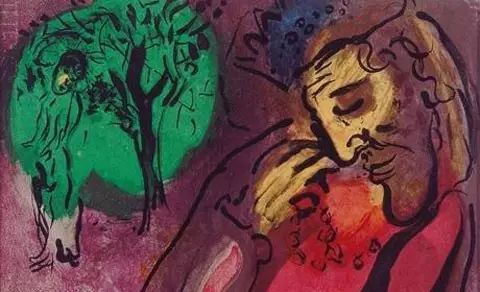此诗是唯理达《撒母耳记》教学单元中所引,但查遍网上竟无中译(或我孤陋寡闻),仅有卞之琳先生的一段节译,而且不是我要的这段。于是强译出来,以解燃眉之急。盼能引真正美玉出来。错译之处也请大家指出,谢谢!
在敬虔的年代,祭司掌权之前,
一夫多妻不算犯罪,甚是常见;
一个人的德性可以成倍布散,
一夫一妻却受诅咒般地受限;
他性致勃勃,百无禁忌,
妃嫔无数,雨露均沾;
以色列王奉天承运,
恩泽广布,遍地龙涎,
来者不拒,不挑不拣,
时时遗情,处处留念。
米甲皇后,头戴凤冠,
金墀见恶,恩泽不返:
此后众女蜂起,虎视眈眈,
愿王叶茂枝繁,恐后争先。
不过龙床好上,
龙子难产。
大卫虽子嗣众多,遍满地面,
却无人如押沙龙般美貌勇敢;
即或没有祭司们的肉麻美言,
明君早已因此子类己而矜满;
或许他命中注定要有此盲点,
以致准备让这美发少年接班。
他早年就在列国成名,
列王列邦都与他结盟;
平安时他也不想打仗,
看起来他是为爱而生。
他想啥来啥,干嘛嘛成,
对他而言一切都惬意轻松;
他的举止全都带着恩泽,
他的面色犹如乐园启封。
带着被大卫纵容的窃喜
他年轻的心愈发奔放不羁;
他心想事成,无往不利,
轻松娶了迷人的安娜贝拉为妻。
他或许犯了错,——又有谁能不犯错?
他父亲或许就不犯,反正谁也看不见。
权力被转移,法律被恶搞,
却轻描淡写,说年轻真好;
暗嫩被杀,罪名是莫须有,
据说是为了复仇,以及名节得保。
因此赞美吧,去爱吧,尊贵的年轻人闯过难关,
国王大卫充耳不闻,浑若无事,照常稳居锡安。
但是人生岂能尽如罪人之意;
上天毕竟赏善罚恶,山水流转。
犹太人任性顽固,喜怒无常,
一如既往突破底线,试探恩典;
上帝那堕落的百姓骄奢淫逸,
谁也管不了,谁也哄不好;
他们把神换来换去,怎么试都不满意,
一会儿由匠人打造,一会儿让祭司发明;
这些亚当的后裔,自由的令人发指,
开始梦想完全的解放:
无拘无束,史无前例,
不受条文桎梏,不受法律捆绑;
他们将这狂野的梦带往森林和窑洞,
觉得除了蛮族,人人都可奴役。
扫罗方死,尸骨未寒,他们想都不想
就拥立了伊施波设这个蠢蛋;
这人拒绝希伯伦的大卫,
而将军已经立他为王;
这些个犹大人,德性最高的时候,
搞笑功夫也远胜忠诚,
于是马上开始思考他们何以忍了这么久,
就是他们亲手所立的这个白痴国王;
他们觉得废立之事不过如此,
那何不把他融铸为金牛——另立一国。
但这纯属临时起意;并无成谋,
流氓们无意再趟浑水:
冷眼旁观的以色列人,洁身自好,
深知和谐社会有多么重要;
因此战战兢兢地回顾从前,
眼睛不说谎,刀伤线未拆,
伤疤仍然在,想想都心塞,
往事不如烟,内战刚打完。
于是稳健人士,就此宣誓:
稳定压倒一切,平衡才是共识;
所以大卫的温和恰如其分,
坏蛋们竟找不到借口起事。
但人的天性毕竟顽梗偏执,
老奸巨猾的魔鬼仍想染指,
老谋深算的恶棍贼心不死;
老头阴魂不散,现在只差个计策。
计策计策,实在大意不得,
否则怎能废除王权,走向共和。
原文:John Dryden:《Absalom and Achitophel》
In pious times, ere priestcraft did begin,
Before polygamy was made a sin;When man on many multiplied his kind,
Ere one to one was cursedly confined;
When nature prompted, and no law denied,
Promiscuous use of concubine and bride;
Then Israel’s monarch after heaven’s own heart,
His vigorous warmth did variously impart
To wives and slaves; and, wide as his command,
Scattered his Maker’s image through the land.
Michal, of royal blood, the crown did wear,
A soil ungrateful to the tiller’s care:Not so the rest; for several mothers bore
To godlike David several sons before.
But since like slaves his bed they did ascend,
No true succession could their seed attend.
Of all the numerous progeny was none
So beautiful, so brave, as Absalon;
Whether inspired by some diviner lust,
His father got him with a greater gust;
Or that his conscious destiny made way,By manly beauty, to imperial sway.
Early in foreign fields he won renown,
With kings and states, allied to Israel’s crown;
In peace the thoughts of war he could remove,
And seemed as he were only born for love.Whate’er he did, was done with so much ease,In him alone ’twas natural to please;His motions all accompanied with grace,
And paradise was opened in his face.
With secret joy indulgent David viewedHis youthful image in his son renewed;
To all his wishes nothing he denied,
And made the charming Annabel his bride.
What faults he had, — for who from faults is free?
His father could not, or he would not see.Some warm excesses, which the law forbore,
Were construed youth that purged by boiling o’er;
And Amnon’s murder, by a specious name,
Was called a just revenge for injured fame.
Thus praised and loved, the noble youth remained,
While David undisturbed in Sion reigned.
But life can never be sincerely blest;
Heaven punishes the bad, and proves the best.
The Jews, a headstrong, moody, murmuring race,
As ever tried the extent and stretch of grace;God’s pampered people, whom, debauched with ease,No king could govern, nor no God could please;Gods they had tried of every shape and size,
That godsmiths could produce, or priests devise;
These Adam-wits, too fortunately free,
Began to dream they wanted liberty:And when no rule, no precedent was found,Of men, by laws less circumscribed and bound;
They led their wild desires to woods and caves,
And thought that all but savages were slaves.
They who, when Saul was dead, without a blow,
Made foolish Ishbosheth the crown forego;
Who banished David did from Hebron bring,
And with a general shout proclaimed him king;
Those very Jews, who at their very best,Their humour more than loyalty exprest,Now wondered why so long they had obeyedAn idol monarch, which their hands had made;
Thought they might ruin him they could create,
Or melt him to that golden calf, — a State.But these were random bolts; no formed design,Nor interest made the factious crowd to join:The sober part of Israel, free from stain,
Well knew the value of a peaceful reign;
And, looking backward with a wise affright,
Saw seams of wounds dishonest to the sight;
In contemplation of whose ugly scars,They curst the memory of civil wars.
The moderate sort of men, thus qualified,
Inclined the balance to the better side;And David’s mildness managed it so well,The bad found no occasion to rebel.But when to sin our biassed nature leans,
The careful devil is still at hand with means,
And providently pimps for ill desires;
The good old cause, revived, a plot requires.
Plots, true or false, are necessary things,
To raise up commonwealths, and ruin kings.
附:课后题
1.德莱顿如何描述大卫?
答:大卫被形容为是一个淫荡好色之徒,将“上帝的形象”布满以色列——意思是,他和很多女人有很多孩子。
2.德莱顿如何形容大卫对押沙龙的态度?
答:大卫放纵押沙龙,押沙龙成了一个被惯坏的孩子。他是大卫的孩子中最有吸引力和最有国王范儿的。
3.研究约翰·德莱顿的生平。他的诗是在影射他的时代的某个(些)人吗?德莱顿是如何用诗来讽刺的?讨论讽刺的作用。
答:是的,这首诗是一首政治讽刺诗,写于1681年。他在取笑英国政坛上的一个党派,就是辉格党,他们想要拥立蒙莫斯公爵而非约克公爵来继承查尔斯二世的王位。约克公爵后来成为了詹姆士二世。
对应表
大卫王 查尔斯王
押沙龙 詹姆士·斯科特,蒙莫斯公爵
米甲 布拉干萨的凯瑟琳,查尔斯的王后
扫罗 奥利弗·克伦威尔
伊施波设 理查德·克伦威尔
犹太人 新教徒

阅读原文
查看更多



